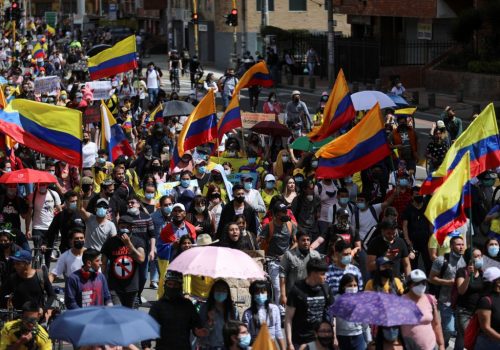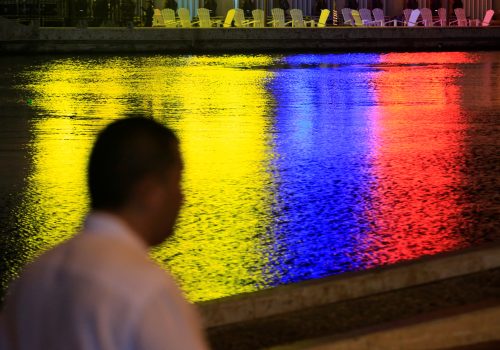Democratic institutional strength before and beyond elections: The case of Brazil
Table of contents
Introduction
The case of Brazil: A young, yet resilient democracy
A stronger democracy in the long run
The role of the United States and the international community
Conclusion
Acknowledgements
Brazil—Latin America’s largest economy and the fourth-largest democracy in the world—will elect its next president, governors, congress, and state-level assemblies in October 2022. This is one of the most momentous elections in recent years, a result of the inflection point that Brazil faces alongside concern about what may transpire on the day of the election and in the days afterward. This uncertainty, combined with global trends of declining democratic freedoms in recent years, suggests that in the aftermath of the October elections, Brazil has an opportunity to reinforce efforts to strengthen its institutions and recalibrate its democracy to meet domestic and global challenges. This issue brief compiles actionable recommendations for Brazil to do just that.
Introduction
At the 2022 Summit for Democracy, President Joe Biden noted that democratic backsliding is the “defining challenge of our time.”1Joe Biden, “Remarks by President Biden at the Summit for Democracy Opening Session,” White House, December 9, 2021, https://www.whitehouse.gov/briefing-room/speeches-remarks/2021/12/09/remarks-by-president-biden-at-the-summit-for-democracy-opening-session/.
Democracy, as a system of government, is ever evolving. However, democratic freedoms have been waning worldwide for the past sixteen years.2Sarah Repucci and Amy Slipowitz, “Freedom in the World 2022: The Global Expansion of Authoritarian Rule,” Freedom House, February 24, 2022, https://freedomhouse.org/article/new-report-authoritarian-rule-challenging-democracy-dominant-global-model. In 2021, twice as many countries lost civil liberties and freedoms compared to those that improved them.3Ibid. Today, more than two-thirds of the world population lives in nondemocratic regimes, or in countries that have seen democratic backsliding in recent years.4“Global State of Democracy Report 2021: Building Resilience in a Pandemic Era,” International Institute for Democracy and Electoral Assistance, 2021, https://www.idea.int/gsod/global-report.

This trend also holds true in Latin America and the Caribbean. Authoritarian regimes in Venezuela, Cuba, and Nicaragua have survived for years. Other countries in the region have seen a dramatic decline in civil liberties. According to 2021 data, half of the countries in Latin America and the Caribbean are experiencing some degree of democratic erosion.5“The Americas 2021: Democracy in Times of Crisis,” International Institute for Democracy and Electoral Assistance, 2021, https://www.idea.int/gsod/las-americas-eng-0.
Brazil is no exception to these global trends. The October elections offer an opportunity to begin addressing concerns about the resilience of its democracy. From the state to the national level, Brazilians will have an opportunity to choose the future trajectory of their democracy. The challenges that Brazilian democracy has confronted in recent years—beginning with the massive demonstrations of 2013 and continuing through questioning of the democratic model among some sectors in recent years—suggest that, regardless of which parties and politicians are elected, Brazilians must prioritize strengthening their democratic institutions now, and in the years to come.
The case of Brazil: A young, yet resilient democracy
As the world undergoes a wave of democratic questioning, and even backsliding, Brazilians head to the polls as the country is at a crossroads, making it important to shift its gaze from the headlines of the day to thinking about longer-term solutions to the country’s political crisis.
Brazil is a young democracy. It was not until 1989 that the country held its first direct presidential elections, after the end of the military dictatorship. Since then, Brazilian democracy has made great strides, establishing a well-regarded electoral system, overcoming hyperinflation and economic crises, and consolidating around a vibrant party system.
The October 2022 elections are a crucial test for Brazilian democracy. Although the elections will be another opportunity to see democracy in action, increasingly high levels of polarization and disinformation have contributed to extremist narratives, episodes of violence, and the questioning of democratic principles.
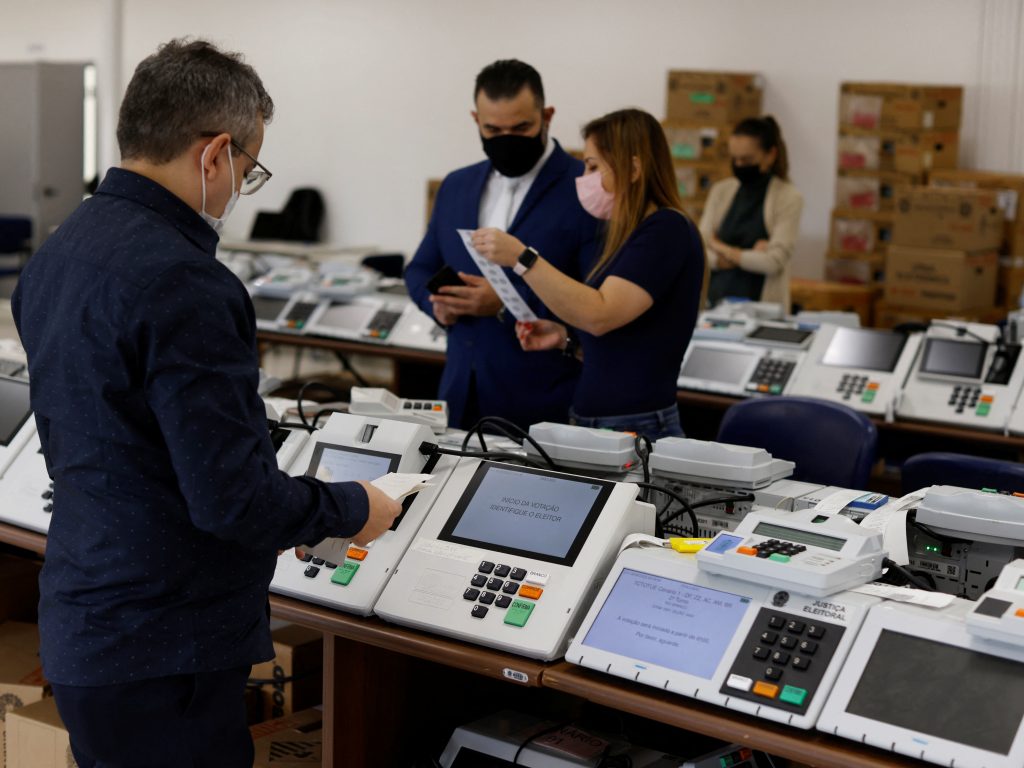
The Brazilian electoral process has been regarded as one of the fastest and most reliable in the world. But the turbulent run-up to the election has raised concerns that the transparency and fairness of democratic processes may be undermined, and that the resiliency of the electoral process and democratic institutions will be tested. Ensuring the integrity of this process, while also mitigating the risk of political violence, is imperative. Any action to further strengthen the resilience of Brazil’s democratic system is contingent upon an electoral process that fosters the proper function of institutions, and protects civil society and an independent media. This critical moment presents a unique opportunity for Brazil to further bolster its democratic system and public trust in its democracy in the years to come.
Over the past generation, Brazilian democracy has fluctuated between moments of high confidence in the democratic system and periods of political and institutional crisis, in which the strength and resilience of its democracy were in doubt. In recent years, Brazilian democratic institutions have risen to the challenge of recalibrating their capabilities to face new challenges.
Three examples illustrate their resilience. First, in response to the COVID-19 pandemic, Brazil was able to delay the electoral process and shift the date of municipal elections, all within the bounds of its constitution.6“Amendment enacted postponing Municipal Elections to November,” Agência Câmara de Notícias, July 2, 2020, https://www.camara.leg.br/noticias/673100-promulgada-emenda-que-adia-eleicoes-municipais-para-novembro/. Further, state and local governors adopted a variety of strategies to respond to the pandemic, with democratic federalism contributing to a panoply of experiments for addressing isolation and lockdown measures.7Márcio Falcão and Fernanda Vivas, “Supreme Court Decides that States and Municipalities Have Power to Set Rules on Isolation,” G1, April 15, 2020, https://g1.globo.com/politica/noticia/2020/04/15/maioria-do-supremo-vota-a-favor-de-que-estados-e-municipios-editem-normas-sobre-isolamento.ghtml. Second, following antidemocratic protests in September 2021 that included messages threatening the Supreme Court and elections, a variety of representatives of democratic institutions (such as the Supreme Court, the House of Representatives, the Senate, civil-society organizations, and the media), came together to publicly condemn such proposals.8“Bolsonaro’s Threats in Speeches on September 7,” BBC Brasil, September 7, 2021, https://www.bbc.com/portuguese/brasil-58479785; “STF, Chamber and Senate Respond to Bolsonaro’s Speech During September 7 Protests,” Canal Rural, September 8, 2021, https://www.canalrural.com.br/noticias/stf-camara-e-senado-repercutem-discurso-de-bolsonaro-durante-manifestacoes-de-7-de-setembro/. The backlash forced President Jair Bolsonaro to change his tone and back down from his more extreme positions.9Josette Goulart and Diego Gimenes, “Bolsonaro Retreats, Apologizes and Stock Market Shoots in the Same Second,” Veja, September 9, 2021, https://veja.abril.com.br/coluna/radar-economico/bolsonaro-recua-pede-desculpas-e-bolsa-dispara-no-mesmo-segundo/. Lastly, the manifestation of professors, jurists, students, civil-society representatives, business leaders, and former and current government officials, through a letter with more than nine hundred thousand signatories in favor of democracy in Brazil, is yet another example of the esteem for democratic principles and respect of civil liberties, especially when institutional credibility is questioned.10“Letter for Democracy is read at USP, and Act has a protest against Bolsonaro,” CNN Brasil, August 11, 2022, https://www.cnnbrasil.com.br/politica/cartas-pela-democracia-sao-lidas-na-faculdade-de-direito-de-usp/.
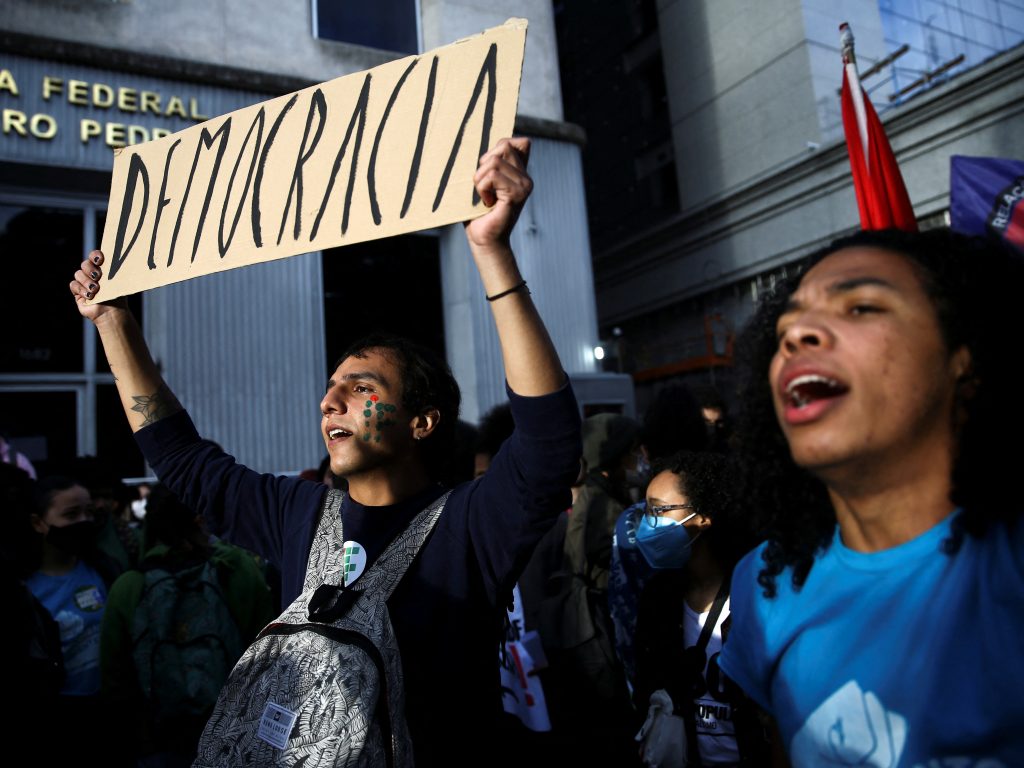
Brazilian institutions are already taking concrete steps to fortify their capabilities ahead of, and beyond, the upcoming electoral cycle. Such efforts are, and will continue to be, important to ensure a healthy democracy. But as we look ahead, even beyond the October elections, what mechanisms are needed to prevent backsliding and foster the resilience of democratic institutions and the strength of Brazilian democracy in the coming years?
A stronger democracy in the long run
In July 2022, the Atlantic Council held individual consultations and convened a group of key Brazilian and international experts from civil-society organizations, the public and private sectors, academia, the press, and others to discuss concrete ways in which Brazil could further support its democratic system ahead of, and beyond, the upcoming elections. Below are actionable recommendations for next steps, including suggestions for the role the United States and the international community could play to support a prosperous Brazilian democracy in the long run.
Institutionalize unwritten democratic norms that ensure independence. In recent years, many unwritten democratic norms have been taken for granted and, in some cases, flaunted. One example is the nomination of the prosecutor general of the republic (PGR), the lead of the federal prosecutorial service (Ministério Público Federal, MPF). Constitutionally, the nomination of the PGR must follow a process that includes presidential nomination and approval by the Senate.11Erick Mota, “Choice of the PGR: Understand how the MPF Triple List works,” Congresso em Foco, September 9, 2019, https://congressoemfoco.uol.com.br/area/congresso-nacional/premio-incentiva-as-boas-praticas-politicas-afirma-conselho-federal-de-contabilidade/. Customarily, however, since 2003 the president selects a name from a list of three names chosen by prosecutors. The benefit of this so-called lista tríplice is that it ensures some coherence within the MPF, as well as ensuring that the prosecutor general is more independent from the other branches of government.
To reinforce checks and balances, institutionalizing such norms and consolidating the autonomy of institutions with political oversight is imperative. The practice of selecting the PGR via a lista tríplice guaranteed an initial layer of independence to the prosecutor general’s role. This was especially important because the MPF should remain autonomous given its oversight role, including in the electoral process.12“About the MPF,” Ministério Público Federal, http://www.mpf.mp.br/o-mpf/sobre-o-mpf. Thus, institutionalizing such norms would ensure the impartiality of the prosecutor general’s nomination and foster the autonomous role of the MPF within the political system, while also reaffirming the independence of the Brazilian judiciary and its prosecutors. Using the example of the lista tríplice for the MPF, instilling processes in other democratic organs—such as the Federal Police, the Federal Accountability Office (TCU), and the Comptroller General of Brazil (CGU)—could be internal mechanisms to guarantee checks and balances, and the appropriate indepence of these offices from established political forces and interested groups.
Address challenges for effective rule of law. To ensure a vibrant democracy, the rule of law must be effective. In Brazil, 17.6 people were killed daily by police forces in 2020, with such violence rarely leading to consequences.13Leandro Machado, “’Police in Brazil Are Not Trained with the Idea of Protecting the Citizen,’ Says Researcher,” BBC Brasil, June 5, 2022, https://www.bbc.com/portuguese/brasil-61601495. Data show that 28 percent of federal officeholders have been investigated or indicted for criminal behavior, while only a handful have been held accountable.14Matthew M. Taylor, Decadent Developmentalism: The Political Economy of Democratic Brazil (Cambridge: Cambridge University Press, 2020), 151. In the case of the state of Rio de Janeiro, for example, members of militias and organized-crime groups also have ties to the political system.15Joana Oliveira, “Rio’s militias increasingly articulate with city halls and legislatures, study points out,” Pais, October 26, 2020, https://brasil.elpais.com/brasil/2020-10-26/milicias-do-rio-se-articulam-cada-vez-mais-com-prefeituras-e-casas-legislativas-aponta-estudo.html. These data imply that strengthening the rule of law remains a key challenge. Better trainings for police forces to address abuses, reforms to oversight agencies to improve the accountability of Brazil’s judicial system, and fostering a lawfulness culture through the school system and civil-society activism could help ensure the effectiveness of the rule of law, while also targeting the younger generations as positive agents of change, and promoters of democracy and the rule of law.
Depoliticization of the armed forces. The armed forces are a state institution responsible for protecting the sovereignty of the state, the order of the democratic system, and the safety of citizens, while also guaranteeing the ability of the three branches of government to properly function.16“Estado-Maior Conjunto das Forças Armadas,” Governo do Brasil, Ministério da Defesa, last visited August 24, 2022, https://www.gov.br/defesa/pt-br/assuntos/estado-maior-conjunto-das-forcas-armadas. As such, the armed forces must remain impartial in politics. In recent years, active military officials have taken civil positions within the Brazilian political system. As a way of example is Minister Eduardo Pazuello, a three-star general, as Minister of Health.17Giulia Granchi, “Jungmann: ‘Military Will Not Embark on Any Coup Adventure,’” BBC Brasil, August 19, 2022, https://www.bbc.com/portuguese/brasil-62600301. Even in the constitution, deepening and solidifying the impartiality of the armed forces is imperative for the proper control of powers within the democratic system. Congress should take a more active role in ensuring this impartiality, as it began to do with a bill introduced in 2021 that aims to clarify the role of the armed forces and active military in the political system.18“Project Makes It Clear in the Law Nonpartisan Character of the Armed Forces,” Portal da Câmara dos Deputados, January 31, 2022, https://www.camara.leg.br/noticias/846116-projeto-deixa-claro-na-lei-carater-apartidario-das-forcas-armadas/. It is critical for the military, the police, and members of any state institutions to refrain from any interference in political and political party-based activities—including, but not limited to, the elections.
Ensure equitable political representation. There has been long-standing dissatisfaction with the lack of representativeness of the political system. Women represent more than 50 percent of the Brazilian population, yet account for only about 15 percent and 13 percent of representatives in the House and the Senate, respectively. The data are just as concerning for other groups. Ensuring better representation and equal participation in politics by women, indigenous communities, black Brazilians, and other marginalized groups would be a first step in having a better representation of Brazilian society at the decision-making table and, thus, more effective public policies to target their needs. More ambitious goals and affirmative action would help to move Brazil in that direction. However, enforcement is also imperative. Brazil has a gender quota requiring that women make up 30 percent of candidates for political parties. But lack of incentives for further engagement of women in politics, in addition to the high number of cases of violence against women in politics and structural imbalances, limit the potential for women’s equitable participation.19Renata Galf and Paula Soprana, “Law on Political Violence Against Women Premieres with Up to 6 Years in Prison,” Folha de S. Paulo, July 30, 2022, https://www1.folha.uol.com.br/poder/2022/07/lei-sobre-violencia-politica-contra-mulher-estreia-com-pena-de-ate-6-anos-de-prisao.shtml. New legislation that aims to punish violence against women in politics, in effect for the 2022 elections, is a first step in that direction.20Ibid. Civil society has an important contribution to make in monitoring and denouncing cases of violence against women in politics, including those happening virtually. In addition to monitoring, electoral agencies should follow through on the enforcement of this legislation. Establishing the means through which more women could take on leadership positions in political bodies and parties could help push Brazilian politics toward more realistic representation and actual participation.
Safeguard a welcoming environment for a vibrant civil society. Among many actors in healthy and vibrant democracies, civil society and the media play key roles in ensuring a healthy public debate and a democratic political system. In Brazil, journalists and activists often face dangerous threats against their activities, and even their lives. Journalists Conrado Hubner and Patricia Campos Mello faced intimidation for criticizing political figures, while journalist Dom Phillips and activist Bruno Pereira were killed in 2022 during an excursion in the Brazilian Amazon, apparently for photographing illegal fishing in the area.21Paulo Roberto Netto, “Judge Rejects Aras’ Appeal in Case Against Conrado Hübner,” Poder360, October 21, 2021, https://www.poder360.com.br/justica/juiza-rejeita-recurso-de-aras-em-processo-contra-conrado-hubner/; “Brazil: Journalists Face Intimidation During Election Campaign,” ABRAJI, October 25, 2018, https://www.abraji.org.br/noticias/brasil-jornalistas-enfrentam-intimidacao-durante-campanha-eleitoral; Dom Phillips and Bruno Pereira, “Three Charged in Brazil with Murder of Dom Phillips and Bruno Pereira,” Guardian, July 22, 2022, https://www.theguardian.com/world/2022/jul/22/three-charged-brazil-murder-dom-phillips-bruno-pereira.
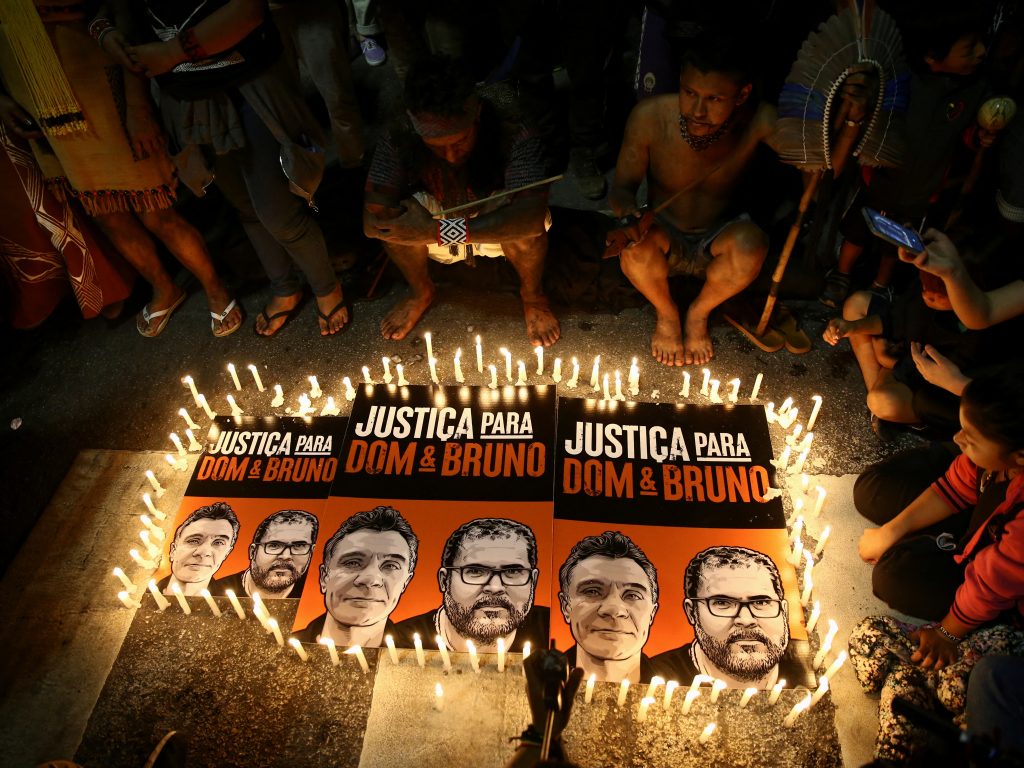
In addition to further bolstering safeguards for press freedom, respect for and inclusion of perspectives from civil-society organizations, among other stakeholders, is imperative to promote effective public policies—and a democratic system that delivers to its citizens. Further cooperation among civil-society organizations, domestically and internationally, could boost the role and significance of these voices within Brazil. More coordinated efforts—from local associations to leading international civil-society organizations in country—would help promote a louder and more cohesive voice for civil society in Brazil. This was recently done through a letter with more than three thousand signatories, including former Supreme Court justices, actors, musicians, and even executives, expressing their support for democracy and trust in the Brazilian voting system.22Michael Pooler, “Brazil’s Civil Society Defends Democracy against Jair Bolsonaro Attacks,” Financial Times, July 27, 2022, https://www.ft.com/content/858e34de-cd74-4902-bb02-8bbad747c286. In addition, guaranteeing penalties for intimidation against civil-society representatives, as well as members of the media, is also imperative to safeguarding a prosperous environment for independent civil society and media.
Further strengthening institutional capabilities to manage the challenges of disinformation. Disinformation and misinformation are global challenges. As such, Brazil’s Electoral Supreme Court (TSE, in Portuguese) has prioritized disinformation as a challenge to the electoral processes in 2022 and beyond. Brazilian institutions, civil-society organizations, fact-checking bodies, and news outlets should work together to mitigate impact and risks. Based on the developments that unfolded after the US elections in 2020—including, but not limited to, January 6—as well as the role that disinformation played in Brazilian elections in 2018 and 2020, TSE established partnerships with social media and messaging platforms, creating a united front to mitigate risks and raise awareness to the known challenge of disinformation.23“Presidente Do Tse Institui Frente Nacional De Enfrentamento à Desinformação,” Tribunal Superior Eleitoral, March 30, 2022, https://www.tse.jus.br/comunicacao/noticias/2022/Marco/presidente-do-tse-institui-frente-nacional-de-enfrentamento-a-desinformacao. This is a proactive initiative to promote and endure the credibility of electoral bodies. To go one step forward, Brazilian news outlets could use already-established COVID-19 data-gathering strategies and go directly to local and state governments to identify disinformation and its sources. This strategy could facilitate and speed up the work of fact-checking institutions in explaining disinformation, of the media (and TSE itself) in countering and spreading it, and of social media platforms in removing it, as appropriate. Overall, having a more coordinated civil society and safeguarding an independent media will result in greater checks against authoritarian tendencies.
Re-establish trust in the political system and foster civic engagement beyond electoral cycles. In recent history, corruption cases among politicians, disinformation, misinformation, and other factors have exacerbated distrust in political institutions in Brazil.24“Confiança do Brasileiro Nas Instituições é a Mais Baixa Desde 2009,” Ibope Inteligência, August 9, 2018, http://www.ibopeinteligencia.com/noticias-e-pesquisas/confianca-do-brasileiro-nas-instituicoes-e-a-mais-baixa-desde-2009/. Polarization has also deepened political and social divides. Regaining confidence in the democratic system is an uphill battle. However, in the long run, revigorated trust in the political system is imperative to foster civic engagement beyond electoral cycles. As a fundamental principle of democracy, broad and active civic engagement is essential to fortify an established and well-functioning democracy in Brazil. This educational effort must begin in schools, to educate the next generations to be active and engaged citizens, and to tackle the question of what democracy means.
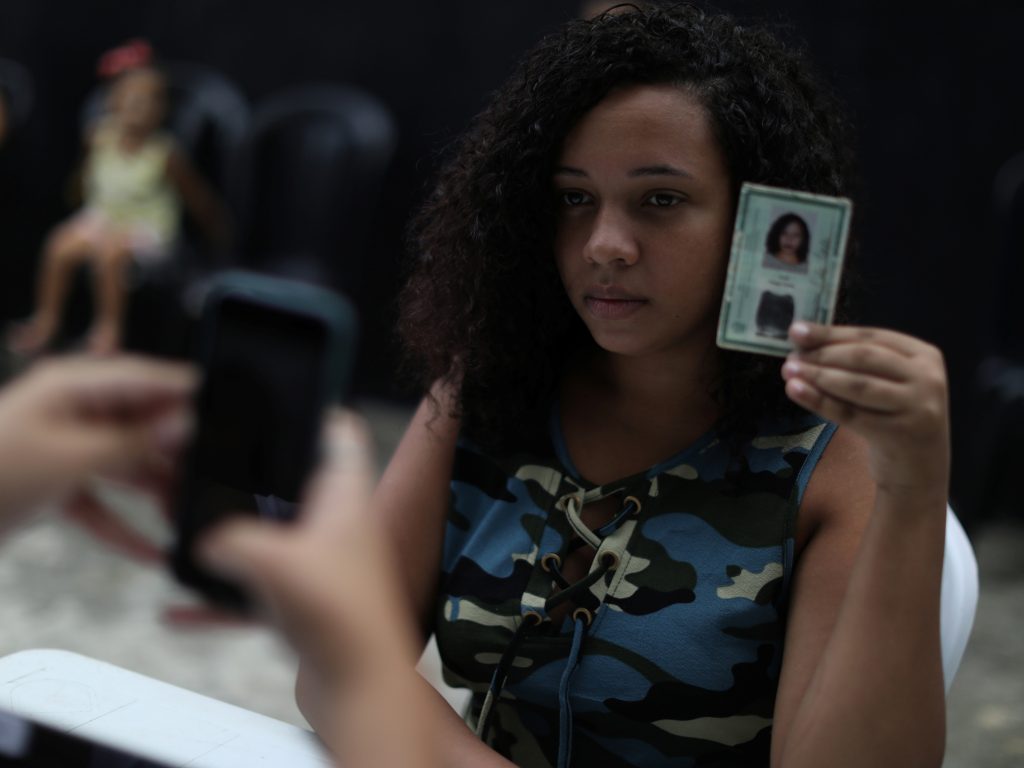
But developing a comprehensive awareness-raising campaign—led by government agencies, in coordination with civil-society organizations and other key actors—could be a first step in the right direction to clarify the roles and responsibilities of elected officials and other public figures, as well as individuals’ rights and duties. In a country where voting is mandatory (with a few exceptions), society must have the tools to make well-informed decisions about its political representatives. Most importantly, only a well-educated society with access to transparent and accurate information, and comprehension of the political game, can hold politicians and democratic institutions accountable.
The role of the United States and the international community
Support immediate recognition of results and quick confirmation of the legitimacy of the electoral process. Given Brazil’s electronic-voting system, electoral results are determined and announced on the same day elections are held. The agility of the system and the seal of credibility given by international recognition curbs potential unrest in the expectation of results. As such, the international community, represented by individual countries and international organizations, must be able to recognize the legitimacy of results immediately after their announcement.
Continuing the long tradition of welcoming international electoral-observation missions, the upcoming elections will include missions from the Organization of American States, Mercosur’s Parliament, and the Inter-American Union of Electoral Organizations (Uniore).25“Eleições 2022: TSE Assina Acordo e Formaliza Missão de Observação da Uniore,” Tribunal Superior Eleitoral, August 2, 2022, https://www.tse.jus.br/comunicacao/noticias/2022/Agosto/eleicoes-2022-tse-assina-acordo-e-formaliza-missao-de-observacao-da-uniore. These missions should aim to release their verdicts on the freedom and fairness of the electoral process quickly, ideally no more than forty-eight hours following Election Day. Beyond the electoral cycle, countries should be explicit in recognizing the historical respect of Brazil toward its democratic system and principles, as well as efforts to improve their capabilities. The United States, for example, recently endorsed trust in the Brazilian electoral system, following questions about the legitimacy of this process.26“U.S. Again Defends Brazil’s Voting System Questioned by Bolsonaro,” Reuters, July 19, 2022, https://www.reuters.com/world/americas/us-again-defends-brazils-voting-system-questioned-by-bolsonaro-2022-07-20/.
Establish a US-Brazil high-level dialogue on democracy promotion. In the context of recent commitments made by both the United States and Brazil on the occasion of the Summit for Democracy, both countries restarted the US-Brazil Human Rights Working Group. This is one step forward in both countries’ efforts to strengthen their own democracies and promote the principles of a rules-based order globally. Given similarities and the strong, historic partnership between the United States and Brazil, both countries could benefit from a more direct dialogue in terms of best practices and lessons learned with regard to common challenges to democracy, and potential common solutions. More broadly, high-level cooperation on this front would safeguard principles of a rules-based democratic order, in addition to deepening the bilateral relationship and fostering similar practices across the hemisphere. Within this framework, further cooperation with the US Department of State, and even the US Departments of Justice and Defense, could help move the needle forward, while also including civil-society and private-sector representatives from both countries.
Conclusion
The next Brazilian government will face a critical moment to strengthen the country’s democracy and its institutions to prove effective in addressing citizens’ needs, especially in challenging times both economically and socially. A key ingredient for democratic crisis is the growing belief that democratic government does not serve citizens’ needs. Addressing this issue and rebuilding trust in the political system are vital for long-term domestic stability in Brazil.
This issue brief aimed to suggest a path forward to begin this task.
Beyond Brazil itself, the country’s democracy is a bellwether for democratic health in the Western Hemisphere. The polarization, concerns of electoral violence, marginalization of minority voices, and other patterns occurring in Brazil must be addressed and condemned. Only through systemic analysis and prevention can all stakeholders work to guarantee democratic health presently, and in the years to come.
Acknowledgements
Many of the ideas in this spotlight were informed by a July 27 strategy session organized by the Atlantic Council, which featured the participation of key Brazilian and international experts from civil-society organizations, the public and private sectors, academia, the press, and others. We thank the many participants in the strategy session, including those who gave permission to be publicly acknowledged: President Laura Chinchilla, Ambassador Michael McKinley, Ambassador Liliana Ayalde, Miriam Kornblith, Feliciano Guimarães, Patricia Campos Mello, Flávia Pellegrino, Guilherme Casarões, Bruno Brandão, Emilia Carvalho, Thiago Esteves, Cintia Hoskinson, and Francisco Brito. This document is also a product of independent research and consultations carried out by the Atlantic Council’s Adrienne Arsht Latin America Center. We thank those who took the time to share their insights with us, including Daniela Campello and Cesar Zucco. A special thank you also goes to our Brazil nonresident senior fellow, Ricardo Sennes, for the countless advice through the years and during the production of this publication. Isabel Bernhard provided invaluable writing and editorial support. Thank you to Jason Marczak, senior director of the Adrienne Arsht Latin America Center, and Maria Fernanda Bozmoski, deputy director for programs, for their guidance. Finally, the Atlantic Council would like to thank Action for Democracy for the partnership and generous support, as well as the Brazilian Center for International Relations (CEBRI) for its continued collaboration, as an institutional partner to this initiative.
About the author
Valentina Sader is associate director at the Atlantic Council’s Adrienne Arsht Latin America Center, where she leads the center’s work on Brazil, gender equality, and diversity, and manages its advisory council. She has co-authored publications on the US-Brazil strategic partnership and coordinated events with high-level policymakers, business leaders, and civil-society members in both Brazil and the United States. Valentina provides regular commentary in English and Portuguese on political and economic issues in Brazil to major media outlets. Prior to joining the Atlantic Council, Valentina worked at the Eurasia Group, the embassy of Brazil in Washington, DC, and the mission of Brazil to the Organization of American States (OAS). Valentina holds a bachelor’s degree in international studies from American University. Originally from Brazil, Valentina is a native Portuguese speaker, fluent in English, and proficient in Spanish.

The Adrienne Arsht Latin America Center broadens understanding of regional transformations and delivers constructive, results-oriented solutions to inform how the public and private sectors can advance hemispheric prosperity.
Related content
Image: A child and supporter of Brazil's President Jair Bolsonaro holds a Brazilian flag in front the Alvorada Palace, amid the coronavirus disease (COVID-19) outbreak, in Brasilia, Brazil, April 26, 2020. REUTERS/Adriano Machado
